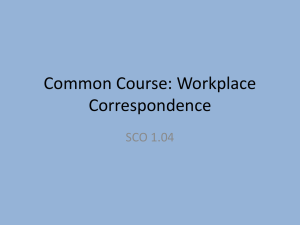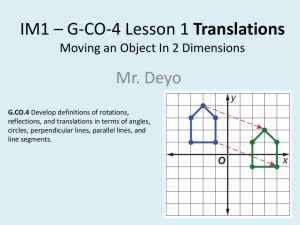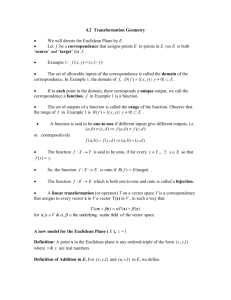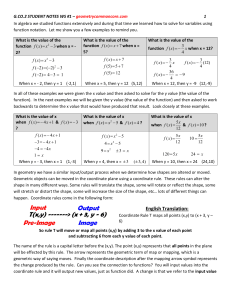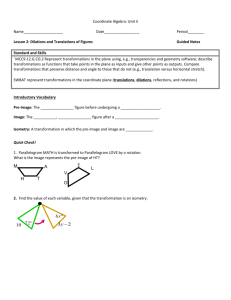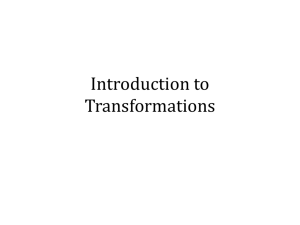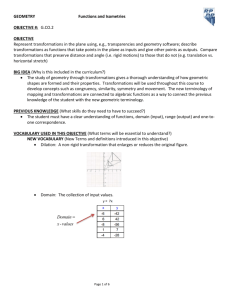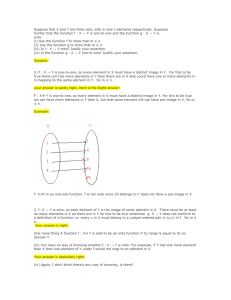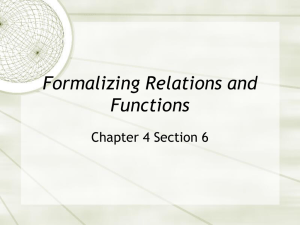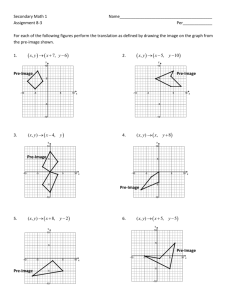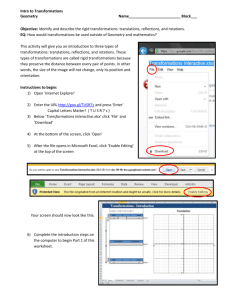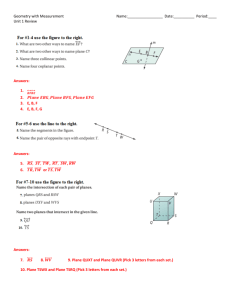A transformation is a one to one correspondence between
advertisement
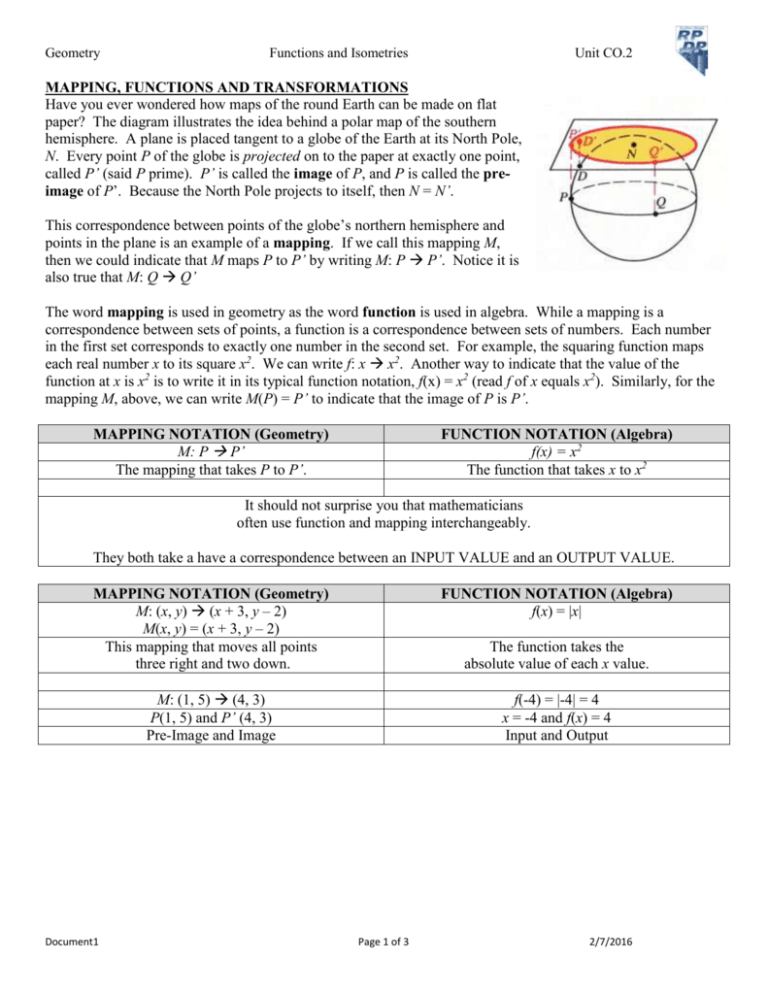
Geometry
Functions and Isometries
Unit CO.2
MAPPING, FUNCTIONS AND TRANSFORMATIONS
Have you ever wondered how maps of the round Earth can be made on flat
paper? The diagram illustrates the idea behind a polar map of the southern
hemisphere. A plane is placed tangent to a globe of the Earth at its North Pole,
N. Every point P of the globe is projected on to the paper at exactly one point,
called P’ (said P prime). P’ is called the image of P, and P is called the preimage of P’. Because the North Pole projects to itself, then N = N’.
This correspondence between points of the globe’s northern hemisphere and
points in the plane is an example of a mapping. If we call this mapping M,
then we could indicate that M maps P to P’ by writing M: P P’. Notice it is
also true that M: Q Q’
The word mapping is used in geometry as the word function is used in algebra. While a mapping is a
correspondence between sets of points, a function is a correspondence between sets of numbers. Each number
in the first set corresponds to exactly one number in the second set. For example, the squaring function maps
each real number x to its square x2. We can write f: x x2. Another way to indicate that the value of the
function at x is x2 is to write it in its typical function notation, f(x) = x2 (read f of x equals x2). Similarly, for the
mapping M, above, we can write M(P) = P’ to indicate that the image of P is P’.
MAPPING NOTATION (Geometry)
M: P P’
The mapping that takes P to P’.
FUNCTION NOTATION (Algebra)
f(x) = x2
The function that takes x to x2
It should not surprise you that mathematicians
often use function and mapping interchangeably.
They both take a have a correspondence between an INPUT VALUE and an OUTPUT VALUE.
MAPPING NOTATION (Geometry)
M: (x, y) (x + 3, y – 2)
M(x, y) = (x + 3, y – 2)
This mapping that moves all points
three right and two down.
FUNCTION NOTATION (Algebra)
f(x) = |x|
M: (1, 5) (4, 3)
P(1, 5) and P’ (4, 3)
Pre-Image and Image
f(-4) = |-4| = 4
x = -4 and f(x) = 4
Input and Output
Document1
The function takes the
absolute value of each x value.
Page 1 of 3
2/7/2016
Geometry
Functions and Isometries
Unit CO.2
Mappings and Functions
A correspondence between two sets A and B is a mapping of A to B IF AND ONLY IF each member of A
corresponds to one and only one member of B (This is also the definition for functions).
Mapping/Function
Each value in set A
has exactly one value
in set B.
Example
f(x) = x + 3
f(2) = 2 + 3 = 5
(2, 5)
Mapping/Function
Each value in set A
has exactly one value
in set B.
Example
f(x) = x2
f(3) = 32 = 9
(3, 9)
f(-3) = (-3)2 = 9
(-3, 9)
NOT
The A value
has TWO values
in set B.
Example
f(x) = ± x
f(5) = ± 5
(5, 5) & (5, -5)
Mapping/Function
Each value in set A
has exactly one value
in set B.
Example
f(x) = x4 + 1
f(2) = 24 + 1
(2, 17)
f(-2) = (-2)4 + 1
(-2, 17)
Transformations and One to One Correspondence Functions
A mapping is a transformation if and only if it is a one to one mapping of the plane onto itself.
TRANSFORMATION
One to One
Correspondence.
NOT
F has two
pre-images.
NOT
A has
two images.
NOT
G has two
pre-images.
A transformation is a one to one correspondence between points of the plane such that
every point in the plane is the image of a point of the plane and no two points have the
same image.
QUESTIONS
1) A = {…, -3, -1, 0, 1, 2, 3, …}, all the integers, and B = = {0, 1, 4, 9, 16, …}, all the perfect squares.
Let C be a correspondence between each integer and its square.
a) Find C(-5), C(3), C(0) and C(5).
b) Is C a mapping? Explain.
c) Find the pre-image(s) of 0; and of 16.
d) Is C a one to one mapping? Explain.
2) Suppose T(x, y) = (x, y – 2) is a transformation. Given A(-1, 5), B(2, 2) and C(0, 9).
a) Find the images of A, B & C.
b) Find E the pre-image of E’(3, 4).
Document1
Page 2 of 3
2/7/2016
Geometry
Functions and Isometries
Unit CO.2
3) Suppose T(x, y) = (2x, 3y) is a transformation. Given A(-1, 5), B(2, 2) and C(0, 9).
a) Find the images of A, B & C.
b) Find E the pre-image of E’(4, 12).
c) Find F the pre-image of F’(-12, 6).
d) Find G the pre-image of G’(5, 10).
4) Given the following correspondences, determine the following.
#3
#2
#1
#4
5)
6)
7)
8)
#5
#6
a) Which of the provided correspondences are mappings (functions)?
b) Which of the provided correspondences are transformations (one to one functions)?
a) If f(x) = |x|, find f(-3), f(4), f(3) and f(8).
b) Is f a one to one function? Explain.
a) If mapping M: (x, y) (2x, y + 3), find the images of P(-1, 4) and H(3, 5).
b) Is M a transformation? Explain.
a) If g(x) = 2x – 1, find g(8) and g(-8).
b) Find the image of 5.
c) Find the pre-image of -7.
d) Find the pre-image of 18.
O is a point equidistant from parallel lines m and n. A mapping M maps each point P of line m to the
point P’ where PO intersects line n.
P
C'
C
O
P'
m
n
Is the mapping a one to one mapping from line m to line n?
Document1
Page 3 of 3
2/7/2016
